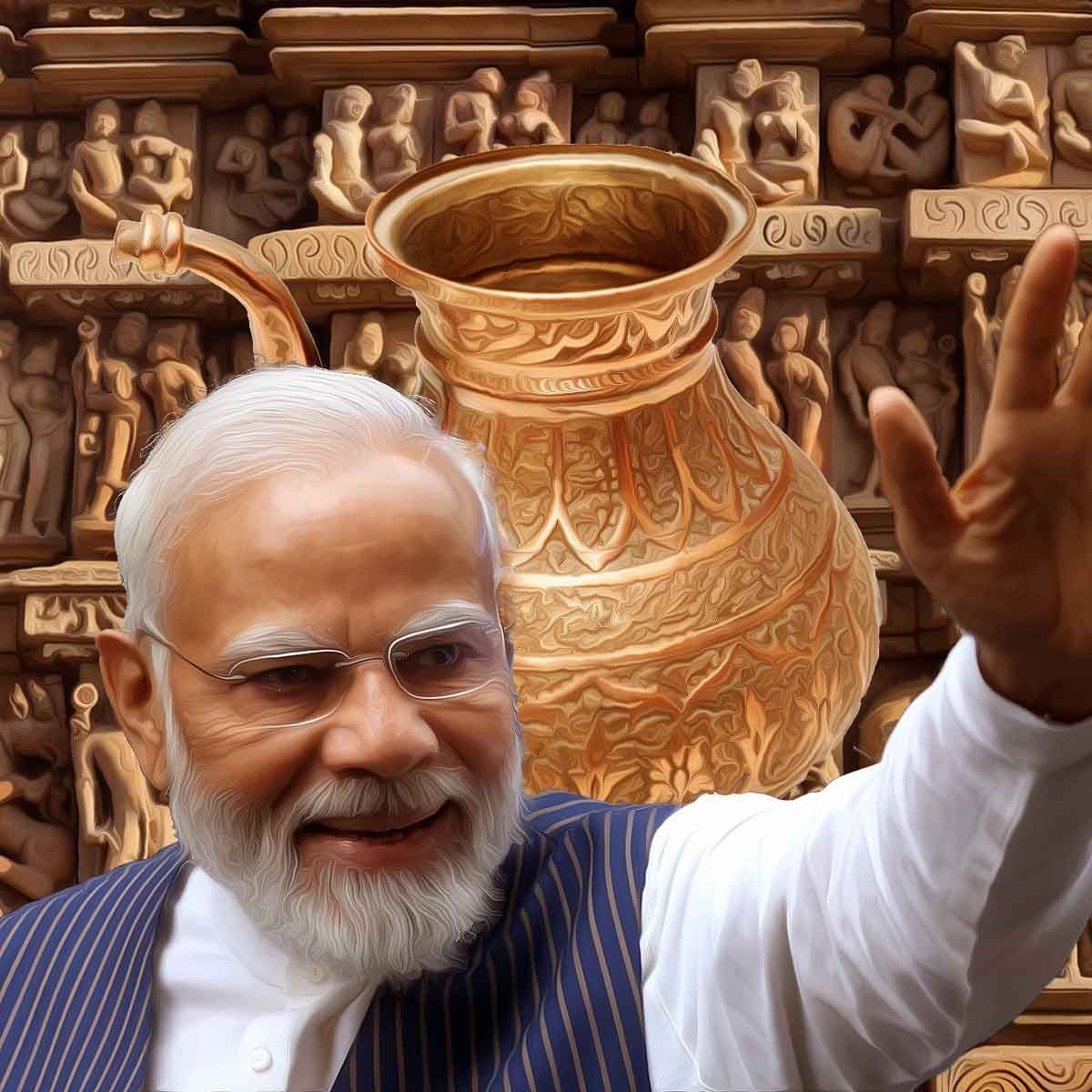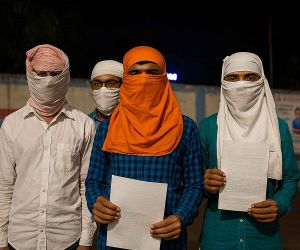MORE COVERAGE
Twitter Coverage
Satyaagrah
Written on
Satyaagrah
Written on
Satyaagrah
Written on
Satyaagrah
Written on
Satyaagrah
Written on
JOIN SATYAAGRAH SOCIAL MEDIA
"दे रे ना बाबा": Saudi Arabia has issued a stern warning to Pakistan, threatening bilateral ties as beggars flood the Kingdom under Umrah visas, prompting Pakistan to enact the Umrah Act and launch a nationwide crackdown on the beggar mafia

In a plot twist that no one saw coming—except maybe everyone—the Saudi Arabian government finally had enough of the steady stream of "pilgrims" from Pakistan, who, instead of performing holy rituals, seemed more focused on the art of panhandling. On Tuesday, September 24, the Kingdom decided it was time to draw a line in the sand, issuing a rather blunt warning to Pakistan: “Stop sending beggars under Umrah visas, or don’t bother calling us for dinner anymore.” Saudi officials made it clear that if Pakistan didn’t handle the situation, the consequences would be more severe than just awkward silences at diplomatic dinners.
|
To the uninformed, Umrah is a sacred pilgrimage to Mecca, available all year round—ideal for those looking to make a spiritual journey or, apparently, for those looking to find a good corner to sit and ask for spare change. “The Saudi Ministry of Hajj” didn’t mince words, issuing a very direct memo to “Pakistan’s Ministry of Religious Affairs, urging them to get a grip on the beggar problem”—a refreshing change from the usual diplomatic pleasantries.
In response, Pakistan’s Ministry of Religious Affairs, who probably didn’t think they’d need a contingency plan for this, quickly threw together an “Umrah Act”. This brilliant idea, straight from the emergency brainstorming session, promises to regulate travel agencies that are supposedly organizing these "holy" trips, ensuring they’re actually booking pilgrims, not people looking to test the generosity of Saudi citizens. Because nothing says ‘effective governance’ quite like rushing to pass a law after the problem is already international news.
But wait—there’s more. The Ministry has now urged the Pakistani government to come up with some ingenious methods to prevent beggars from sneaking into Saudi Arabia under the guise of religious pilgrimage. Maybe they’re thinking of issuing pop quizzes at the airport: “Recite the Fatiha, or no visa for you!”
And just when things were getting desperate, in swoops Pakistan's Interior Minister, Mohsin Naqvi, with all the gusto of a man who’s had enough of this nonsense. He assured Saudi Ambassador Nawaf bin Said Ahmed Al-Malki that Pakistan will unleash its secret weapon—good ol’ “stringent measures.” Translation: They’re finally going after the masterminds behind this beggar brigade. The Federal Investigation Agency (FIA) has been given the green light to crack down on the mafias orchestrating this beggar invasion, proving once and for all that Pakistan won’t let its nationals use Umrah as a golden ticket to freeload.
In an effort to crack down on unauthorized pilgrims, the Saudi government earlier this year issued a fatwa that left no room for loopholes. Performing Hajj without a permit is now strictly prohibited, with hefty consequences awaiting violators. Anyone found undertaking the pilgrimage without the necessary documentation would face a steep fine of 10,000 Riyals—approximately Rs 2.22 lakh—along with the immediate threat of deportation. It’s safe to say that this was a clear message from the Saudi authorities: if you’re thinking about bending the rules, your wallet and one-way ticket back home might not survive the trip.
|
Pakistan planned to block passports of over 2000 beggars so they don’t beg from the entire world
In what can only be described as a desperate yet somewhat creative solution, the Pakistani government decided to take action against its ever-growing export of beggars. Yes, that’s right, they’ve come up with a plan to block the passports of over 2,000 beggars. According to a report from Dawn News TV, the authorities have had enough. Citizens found guilty of begging abroad will now face the rather harsh punishment of having their passports suspended for seven years. Because, clearly, nothing says “we’re serious about cleaning up our international image” like grounding a few thousand professional beggars.
The problem of Pakistani beggars hasn’t just stayed local—it’s been spreading like wildfire across Gulf countries. Last year alone, the Federal Investigation Agency (FIA) made headlines when they removed 16 beggars from a flight at the airport in Multan. This was no ordinary group of travelers; we’re talking about 11 women, four men, and a child—hardly the typical Umrah pilgrims one might expect to see. All were on Umrah visas, headed for Saudi Arabia, with their real mission being less about religious pilgrimage and more about mastering the art of asking for alms in a foreign land.
In a confession that would make anyone question the ingenuity of this whole operation, these “pilgrims” admitted during immigration that they were indeed on their way to the Islamic holy land. But here’s the kicker: they also openly revealed that half of the money they were planning to collect through begging would have gone straight into the pockets of the travel agencies that arranged their not-so-holy voyage.
Yes, you read that right. Not only are these beggars entering under false pretenses, but they’ve also struck deals with the very agencies supposed to ensure genuine pilgrims reach Mecca. It’s a partnership as baffling as it is scandalous. One can only imagine how awkward those conversations must have been when these would-be beggars realized their clever ruse had been foiled.
With all this unfolding, Pakistan’s decision to block passports seems more like a band-aid on a much larger issue. While this move may temporarily halt the international careers of a few thousand beggars, the question remains: will it truly stop the tide, or will the beggar brigades simply find another way around it?
|
Umrah Act
In response to Saudi Arabia’s increasingly urgent concerns about the influx of beggars under the guise of Umrah pilgrims, Pakistan has introduced the Umrah Act. This new legislation will tighten the reins on travel agencies that organize trips to Saudi Arabia, placing them under closer scrutiny to ensure that only legitimate pilgrims make the journey. By increasing state oversight, the authorities aim to prevent further exploitation of the sacred Umrah visa for unlawful activities.
Pakistan’s Ministry of Religious Affairs has also reached out to the Saudi government, asking for collaboration in finding ways to stop beggars from traveling to Saudi Arabia. The aim is to create a united front, tackling this issue at both ends. This step was crucial as Saudi Arabia is increasingly concerned about the impact that these fraudulent pilgrims are having on the kingdom’s religious and social fabric.
In an effort to further reassure Saudi Arabia, Pakistan’s Interior Minister, Mohsin Naqvi, met with Saudi Ambassador Nawaf bin Said Ahmed Al-Malki. During the meeting, Naqvi gave his word that strict action would be taken against what has now been termed the “beggar mafia.” The Pakistani side made it clear that they are fully committed to cleaning up the image of their citizens abroad, especially in the eyes of Saudi authorities, whose patience has been wearing thin.
According to Mohsin, the Federal Investigation Agency (FIA) has been handed the reins to launch a comprehensive crackdown on this well-organized network of beggars. The plan is to dismantle the system that has been exploiting the Umrah visa and tarnishing Pakistan’s reputation on the global stage. This network of beggars has not only undermined the Islamic pilgrimage but has also caused widespread damage to the country's image.
Dr. Arshad Mahmood, Secretary of Overseas Pakistanis, added more weight to this growing issue by stating, as quoted by the Express Tribune, that “several Gulf countries have expressed concerns regarding the behaviour of overseas Pakistanis, particularly in areas of work ethics, attitudes, and involvement in criminal activities.” This isn’t just a problem in Saudi Arabia; it’s part of a larger issue that is causing tension between Pakistan and other Gulf nations.
As a result, Pakistani expats are now facing increased scrutiny from employers and authorities across the Gulf. With rising concerns over their behavior, attitudes, and criminal involvement, the once-open doors for employment are slowly being shut. This has, of course, created a ripple effect, making it harder for genuine workers to secure jobs and opportunities abroad.
Earlier in August, the FIA made headlines again when they offloaded 11 suspected beggars from a Saudi Arabia-bound flight at Karachi airport in a high-profile operation. This was just one of many steps in Pakistan’s ongoing efforts to crack down on the beggar mafia, which has not only become a nuisance but a major embarrassment for the country on the international stage.
In a rather eye-opening revelation, the Senate Standing Committee on Overseas Pakistanis was informed that “around 90 per cent of the beggars arrested abroad were Pakistani nationals.” This shocking statistic has raised serious questions about the underlying causes and systemic issues that have led to such a high number of Pakistani nationals being involved in begging activities overseas. Clearly, there is more to this problem than just visa fraud, and addressing it will require a concerted effort from multiple government bodies.
 |
 Support Us
Support Us
Satyagraha was born from the heart of our land, with an undying aim to unveil the true essence of Bharat. It seeks to illuminate the hidden tales of our valiant freedom fighters and the rich chronicles that haven't yet sung their complete melody in the mainstream.
While platforms like NDTV and 'The Wire' effortlessly garner funds under the banner of safeguarding democracy, we at Satyagraha walk a different path. Our strength and resonance come from you. In this journey to weave a stronger Bharat, every little contribution amplifies our voice. Let's come together, contribute as you can, and champion the true spirit of our nation.
 |  |  |
| ICICI Bank of Satyaagrah | Razorpay Bank of Satyaagrah | PayPal Bank of Satyaagrah - For International Payments |
If all above doesn't work, then try the LINK below:
Please share the article on other platforms
DISCLAIMER: The author is solely responsible for the views expressed in this article. The author carries the responsibility for citing and/or licensing of images utilized within the text. The website also frequently uses non-commercial images for representational purposes only in line with the article. We are not responsible for the authenticity of such images. If some images have a copyright issue, we request the person/entity to contact us at satyaagrahindia@gmail.com and we will take the necessary actions to resolve the issue.
Related Articles
- Facing an economic crisis Nationalist Pakistanis are loathing Saudi Arabia, and they have solutions for all the obstacles: Nukes and opium
- "Unsung Warrior": In the tapestry of resilience, meet Devika Rotawan—a luminous thread forged in the crucible of darkness; at just 11, she bravely testified against Ajmal Kasab, etching her name in the annals of courage amid harrowing 26/11 terror attack
- Speech of Sardar Patel at Calcutta Maidan in 1948 busts the myth of ‘Muslims chose India’ and is relevant even today
- In a major breakthrough, Police have recovered IEDs smuggled across the border to Pakistan backed terrorist sleeper cells, linked to Dawood Ibrahim’s terror module: a number of explosives have also made their way into Gujarat via the water route
- "Listen with the intent to understand, not the intent to reply": Spiritual head of Ajmer Dargah, Hazrat Syed Naseeruddin Chishty on Bilawal Bhutto, “Muslims are far more secure in India than in Pakistan, condemn the venomous language used for PM”
- Direct Action Day triggers The Great Calcutta Killings: Kolkata Paid Its Lives To Create Pakistan
- In a bold stride towards unprecedented growth, India and Saudi Arabia set sights on a staggering $200 billion trade target, heralding a new age of economic partnership and space collaboration, cementing bonds and fostering mutual prosperity
- "जालसाज़": Parvez Ahmed, arrested in Bengaluru for aiding a Pakistani preacher's illegal stay in India, helped several Pakistanis obtain fake identities, including passports, voter IDs, and Aadhaar cards, allowing them to pose as Hindus and settle in India
- Let's see what Sam Manekshaw said when Karan Thapar tried to undermine India’s win in 1971
- Jamaat-e-Islami head Sirajul Haq says that Imran Khan’s departure is the only answer to Pakistan’s crisis, also added that Imran Khan has become an “international beggar” as a result of Pakistan’s arrangement with the International Monetary Fund
- "Aur kab tak - Golden Via Kochi Horror Saga": Ajumon and Majeed deceptively sold and transported two Kerala women Rekha and Usha to Arab families in Kuwait, where they were locked up, abused, starved, tortured, and physically assaulted, finally rescued
- 'Ghustaak-e-Rasool Nupur Sharma beheader will be given Rs 5 million reward - Labbaikians TV': Pakistanis announce bounty on BJP’s Nupur Sharma, Alt News co-founder Zubair had dog-whistled online mob of Islamists
- "आखिर, जौहर क्यूँ होता था": In Pakistan, Salman Waheed was apprehended while digging up a recently-buried woman's grave in Karachi and sexually abusing her corpse, also he shockingly admits to the repeated raping deceased women in the graveyard
- Sharjeel Imam, accused of Delhi riots explained why Indian Muslims have always celebrated Pakistan’s cricket match win against India
- "However deep you dig a well it affords no refuge in the time of flood": Half of Pakistan is under water which led to the catastrophic floods and claimed more than 1000 lives, emergency declared as a deadly flood affected more than 33 million people

























